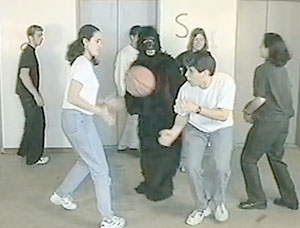Spotting a Gorilla and Saving YOUR Marriage!
https://savethemarriage.com/stmblog/wp-content/themes/corpus/images/empty/thumbnail.jpg 150 150 Lee H. Baucom, Ph.D. Lee H. Baucom, Ph.D. https://secure.gravatar.com/avatar/669b7e375d93f77521ddaba08adb8063?s=96&d=blank&r=pgHave you taken the basketball challenge? Did you try to count the number of times the ball was passed between people dressed in white and people dressed in black? If you are one of the few that has not seen this story, spoiler alert!
In the experiment (you can see the YouTube video here), you are asked to keep track of the number of times the ball is passed between players with white and black t-shirts. You have to really concentrate and be watching for the passes, then count them carefully!

And yet, over 50% of people do not even notice the gorilla — and even insist it was not there — until proven wrong with a replay.
More recently, a researcher decided to see what would happen if you did the same thing with professionals that are trained to notice small things. The chosen “victims” for this research was radiologists. They are the doctors trained to notice abnormalities in x-rays, MRI’s, CAT scans, etc. — highly trained professionals that know how to notice what should not be there!
The researcher placed a matchbook-sized image of an angry gorilla onto scan slides, sent them to the radiologists and asked them to take a look at the slides for malignancy. Now this is important: he gave them a target for which they should be looking.
In his research, 83% of the radiologists did NOT notice the matchbook-sized image! And they are trained to notice and observe abnormalities.
I am not ragging on the radiologists. For a number of years, I was a chaplain in hospital settings and I came to be amazed at the capacity for a radiologist to look at some amorphous shape and see pathology. I have even had the experience of my CAT scan being viewed and pathology noted. So, I have great respect for these professionals.
Here’s the thing: we all suffer from this same malady. Our mind gives us the subject for which we observe. We often see what we expect to see — and according to this research, do not notice what we do not expect to see. The term is “inattentional blindness.”
It is the reason why texting and driving do not mix. When someone is texting and focused on that, their mind is no longer capable of seeing anything out of the ordinary on the road. So, as long as there is no biker, jogger, dog, child, etc., in front of them, or a car that has suddenly stopped, they get away with doing both. But one day, there is something there and they do not see it.
Back to my point, because as much as I hate seeing people messing with their phones and driving, that is not what this blog is about. How does this apply to your marriage?
Let me tell you a story. Last week, I was speaking with a couple in my office. The woman told me a long story that highlighted how her husband had fallen short on being a good partner. She noted what he had done — his actions. At that point, it could have been a discussion of understanding.
But then, she told me WHY he had done what he did. And it reflected some major character flaws and a very dysfunctional family in which he was raised. In her mind, he was just short of needing some sort of heavy-duty rewiring. I heard, though, several other more benign options that might be more about how the two of them dance around each other.
I suggested a couple of these other options. She rejected them outright. She had long ago made an unconscious decision on what she would focus upon. Early in their relationship, she built theories on why he was the way he is. Then, she set out to observe exactly what she had theorized.
From a scientific research perspective, her mistake was deciding on her theory, then looking for evidence to support it. She rejected any evidence that challenged her beliefs.
Now let me be clear: his actions were not always the best, and did not benefit the relationship at all times. He COULD change his responses and they would be at a much better place. And there really are times when we see someone for who they are. That is true for all of us: sometimes we act in less-than-optimal ways, and sometimes our observations are accurate.
But his actions came in a dance that was also affected by her actions. Each created responses of action in the other. And he also had his mistaken theories about her.
My point is this: once we “decide” to see a certain pattern of behavior in our partner (and again, I do not think this is conscious, just destructive), we fail to see the other ways our partner acts. When we decide that a spouse is unloving, and notice all the actions that prove it, we fail to notice the loving actions.
Inattention blindness tends to make our world much more uni-dimensional than it really is. Our mind is simply attempting to deal with all the information coming at us, and takes a short-cut by trying to simplify things. That is not so much the problem.
The problem is, we think our mind more infallible than it is. As I say that, many will think they have a good grasp of this, and know they may not notice everything. But they will then text while driving or continue to pigeon-hole a spouse.
Just maybe we would all be wise to hold a bit more of a “perhaps I am not entirely right” perspective when assuming why a spouse does what he or she does.
Perception is a huge part of my Save The Marriage System. If you are ready to change your perceptions, I invite you to take a look here.

